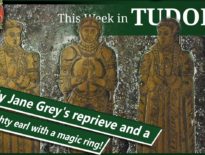In this second part of This Week in Tudor History for week beginning 8th February, I talk about two parliamentary acts that allowed a king to execute his wife and to execute people showing signs of madness; a miscarriage of justice which led to a priest being executed in Elizabeth I’s reign; an Elizabethan astrologer who was ridiculed after his prophecies didn't come true, and a man known as William Waste-all.
11th February 1542 - King Henry VIII gave his assent "in absentia" to an act of attainder against his fifth wife, Catherine Howard, and her lady-in-waiting, Jane Boleyn, Lady Rochford. A bill allowing people showing signs of lunacy was also passed, an awful thing, but the king was determined to take revenge.
12th February 1584, in the reign of Queen Elizabeth I - The executions of five Catholic priests by hanging, drawing and quartering at Tyburn. One of them, James Fenn, suffered a huge miscarriage of justice, being accused of plotting in Rome when he was actually in England, in prison, at the time!
13th February 1564, in the reign of Queen Elizabeth I - Astrologer and physician John Harvey was baptised at Saffron Walden in Essex. Harvey ended up being ridiculed with his brother, Richard, after their prophecies of apocalyptic events didn't come true.
14th February 1492, in the reign of King Henry VII - Death of William Berkeley, Marquis of Berkeley, a man who took part in the last English battle fought between private armies of feudal magnates, but who was nicknamed William Waste All by the family historian.
Videos on other Tudor events for 11-14th February:



Leave a Reply